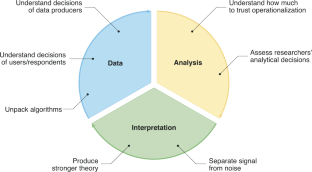Although large-scale data are increasingly used to study human behaviour, researchers now recognize their limits for producing sound social science. Qualitative research can prevent some of these problems. Such methods can help to understand data quality, inform design and analysis decisions and guide interpretation of results.
This is a preview of subscription content, access via your institution
Access options
Access Nature and 54 other Nature Portfolio journals
Get Nature+, our best-value online-access subscription
$29.99 / 30 days
cancel any time
Subscribe to this journal
Receive 12 digital issues and online access to articles
$119.00 per year
only $9.92 per issue
Buy this article
- Purchase on Springer Link
- Instant access to full article PDF
Prices may be subject to local taxes which are calculated during checkout

References
Small, M. L., Akhavan, A., Torres, M. & Wang, Q. Nat. Hum. Behav. 5, 1622–1628 (2021).
Boyd, D. & Crawford, K. Inf. Commun. Soc. 15, 662–679 (2012).
Lazer, D., Kennedy, R., King, G. & Vespignani, A. Science 343, 1203–1205 (2014).
Alba, D. Tracking viral misinformation. The New York Times, https://go.nature.com/3Kszjyw (15 September 2021).
Strong, D. M., Lee, Y. W. & Wang, R. Y. Commun. ACM 40, 103–110 (1997).
Ruths, D. & Pfeffer, J. Science 346, 1063–1064 (2014).
Christin, A. Am. J. Sociol. 123, 1382–1415 (2018).
AlShebli, B., Makovi, K. & Rahwan, T. Nat. Commun. 11, 5855 (2020).
Simmons, J. P., Nelson, L. D. & Simonsohn, U. Psychol. Sci. 22, 1359–1366 (2011).
Breznau, N. et al. Observing many researchers using the same data and hypothesis reveals a hidden universe of uncertainty. Preprint at MetaArXiv, https://doi.org/10.31222/osf.io/cd5j9 (2021).
Salganik, M. J. et al. Proc. Natl Acad. Sci. USA 117, 8398–8403 (2020).
Salganik, M. J., Maffeo, L. & Rudin, C. Harv. Data Sci. Rev. 2.3, https://doi.org/10.1162/99608f92.eecdfa4e (2020).
Blok, A. et al. Big Data Soc. 4, https://doi.org/10.1177/2053951717736337 (2017).
Acknowledgements
The authors thank the University of Bremen Excellence Chairs programme for support.
Author information
Authors and Affiliations
Corresponding author
Ethics declarations
Competing interests
The authors declare no competing interests.
Rights and permissions
About this article
Cite this article
Grigoropoulou, N., Small, M.L. The data revolution in social science needs qualitative research. Nat Hum Behav 6, 904–906 (2022). https://doi.org/10.1038/s41562-022-01333-7
Published:
Issue Date:
DOI: https://doi.org/10.1038/s41562-022-01333-7
This article is cited by
-
Community Teens’ COVID-19 Experience: Implications for Engagement Moving Forward
Journal of Clinical Psychology in Medical Settings (2024)
